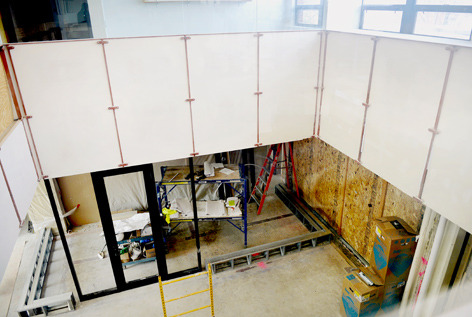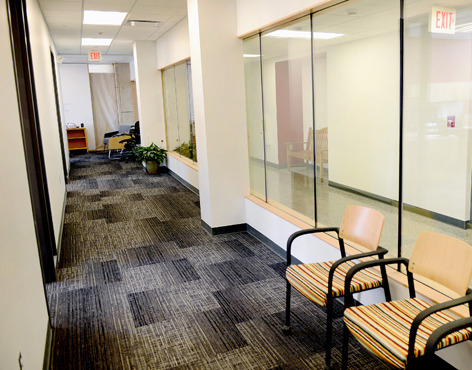Making progress at Lagomarcino

Work continues on a two-level open atrium for the School of Education inside the new north entrance to Lagomarcino Hall. Photo by Amy Vinchattle.
After nearly a year of construction preceded by a year-plus of planning, a significant remodeling of Lagomarcino Hall's north end for the School of Education is in the home stretch. When spring semester starts on Jan. 12, the temporary plywood walls, dust and noise should be gone, and the first floor in full use. Much of the remodeling on the lower and second floors is complete.
Key components of the $5.4 million project, which grew several times over its duration, include a new administrative suite for the School of Education, a relocated and accessible north entrance to Lagomarcino and entry atrium for the school, three state-of-the-art classrooms consolidated along one corridor, and a sprinkler system and new heating/cooling systems in the School of Education spaces.

The School of Education administrative suite is complete in the remodeled north wing of Lagomarcino Hall. Photo by Amy Vinchattle.
Kurtenbach named interim CIO
Jim Kurtenbach has been named interim vice president and chief information officer in information technology services.
Kurtenbach, an associate professor of accounting and former associate dean in the College of Engineering, will begin his new role Jan. 1. He succeeds Jim Davis, who will rejoin the faculty.
Senior vice president and provost Jonathan Wickert said appointing an interim CIO offers an opportunity to complete several large projects before the arrival of a permanent CIO.
"We had planned on conducting a national search for a new permanent CIO to start in 2015, but with the recently approved TIER business cases, changes to Kuali and other efficiency initiatives brought forward by ITS staff, it made sense to appoint an interim leader with institutional knowledge to take advantage of these opportunities," Wickert said.
"Jim's willingness to serve the university in an interim role made the decision an easy one. He will help ITS sustain its momentum and position the unit for future success."
Kurtenbach is an expert in the field of financial reporting and has extensive experience in information systems. His career includes leadership roles in several technology companies, including two Ames-based firms: Demonstratives Inc. (recently merged with Engineering Systems Inc.) and Workiva LLC (formerly known as WebFilings).
A former state representative, Kurtenbach holds a bachelor's degree in industrial administration from Iowa State, a master's degree in accounting from the University of Tulsa, and a Ph.D. in accounting from the University of Missouri-Columbia.
Canceled vs. closed: Winter weather policies

Photo by Bob Elbert.
When the weather outside is frightful, be prepared with this guide to university policies and procedures for severe weather events.
Severe weather policies and information
- Winter Weather FAQ
- ISU Policy Library: Severe Weather and Emergency Closings
- AFSCME Collective Bargaining Agreement (PDF): See Article XI, Section 6, Severe Weather/Emergency Closings
Cancellations and closures
For information on cancellations and closures, check the:
- University homepage
- University Facebook and Twitter accounts
- Campus information center, 294-4357
- Local radio and TV stations
Where to park
If your usual parking lot hasn't been cleared of snow by 7:30 a.m., parking will be available first at:
- Iowa State Center (lots A3, A4, B5 and B6); CyRide will shuttle drivers to campus via the free orange route
- Lots 29 and 30, north of Molecular Biology
- Lot 41, north of General Services Building
If classes are canceled, but the university is not closed
- University offices will remain open
- Employees who can't make it to work should contact their immediate supervisors
- Employees may request to make up the time, use vacation or take leave without pay
- Staff covered by AFSCME should refer to language in the severe weather part of the contract
If the university is officially closed
- Classes are canceled and most university offices are closed
- Vital operation areas (for example, police, parking, food service, power plant, animal care, critical maintenance or snow removal) generally are not closed; employees should follow specific policies established for those areas
- Staff covered by AFSCME should refer to language in the severe weather part of the contract
- Employees who are unsure if they should report to work should communicate with their supervisors
- Some staff members whose offices are closed may elect to work regular hours, with supervisor approval
Deloitte's work for regents is complete but more consultants to be hired
The state Board of Regents' contractual relationship with Deloitte Consulting to find efficiencies and cost-savings at the three regent universities is complete, at least for now.
Meeting telephonically on Nov. 14, board members voted to implement all eight administrative business cases presented by the Deloitte consultants last month. The board also agreed to hire implementation teams itself on four items. Deloitte could be among the bidders for that work.
TIER (Transparent Inclusive Efficiency Review) is a board-initiated review of the three regent universities to identify areas for dollar savings and/or more efficient processes. In February, the board hired Deloitte Consulting to lead the review.
Regent Larry McKibben, who co-chairs the TIER coordinating committee, expressed his satisfaction with Deloitte's work.
"They built a strong case for transformation, making it clear that the status quo is not sustainable for our universities," he said.
The board's TIER project manager Mark Braun said the implementation timelines vary in length, but he anticipates early savings for the universities in the fiscal year that begins July 1, 2015. He said the best opportunity for savings appears to lie with the purchasing business case. Some business cases will generate organizational efficiencies more than dollar savings, he said.
Following is a status update on the 17 business cases the Deloitte team presented to the board in June at the conclusion of phase 1.
Administrative business cases
In approving all eight administrative business cases, the board agreed to issue a single request for proposals (RFP) for assistance in implementing three of them:
- Revise the universities' decentralized human resources service model
- Streamline and standardize how the universities provide some finance transactions
- Reduce duplication of services between central IT and distributed IT units
The RFP process would begin this month and conclude by mid-January, with implementation to begin by Feb. 1.
Taking their cue from the university presidents, board members agreed that five other administrative cases could be implemented among or within the three universities:
- Invest in energy-saving initiatives
- Adjust thermostats in classroom buildings during the summer (Northern Iowa only)
- Replace desktop computers with thin client options
- Reduce the number of software applications purchased or developed within and across the universities
- Take advantage of technology improvements, innovations and leaner staffing requirements to transform central IT services
Academic business cases
McKibben also proposed that the board hire a firm to complete the academic programs portion of the review. Deloitte was in the process of hiring a subcontractor after dismissing KH Consulting, the first firm it hired to oversee the academic review. McKibben said that three academic business cases identified by the first subcontractor would remain in play. They are:
- Develop regent system-wide institutional research reporting and data sharing
- Shorten students' "time to graduation" by improving enrollment management variables such as faculty mix, class sizes and course configurations
- Expand the universities' reach by collaborating to provide online and hybrid distance education degree and certificate programs
"Having the board issue the RFP rather than subcontract through Deloitte will allow faculty leaders at the universities to play a greater role in the selection process, which we feel is in line with the university policies of shared governance," McKibben said.
McKibben said a consultant would assist with the second and third business cases; the board will manage the first one internally.
Interrupted purchasing business case
The board also approved a separate RFP for implementation of a purchasing business case. At its August meeting, the board gave executive director Robert Donley authority to negotiate a separate contract with Deloitte for implementation of a business case that would find savings and efficiencies in the three schools' purchasing operations. However, those negotiations never were completed.
Space utilization business cases
The board voted to seek a service agreement with a Deloitte subcontractor, Ad Astra, for phase 2 work on two more business cases. Ad Astra specializes in course management and scheduling software. The cases are:
- Improve classroom space usage through scheduling policies
- Optimize faculty allocations through a data-informed, student-centered course schedule
Implementation progressing on three others
Braun provided an update on three administrative business cases the board approved for university-led implementation in September. The cases and their anticipated completion dates are:
- Standardize the Regents Admission Index calculation when a student's class rank isn't available, Dec. 15
- Create a common application portal for students who want to apply to more than one regents university, Feb. 1, 2015
- Standardize size and structure of search committees for vacant professional and scientific positions, March 1, 2015
Child care needs are focus of feasibility study
Many Iowa State faculty, staff and students face child care challenges. So university human resources (UHR) and the ISU Research Park have launched a joint child care feasibility study to identify the demand for child care services on campus. Mills Consulting, Concord, Massachusetts, a child care consulting firm that regularly works with universities, is assisting with the study.
Workplace child care facilities often are key to attracting and retaining quality employees. Julie Nuter, associate vice president for UHR, said recent feedback from the University Committee on Women as well as the ISU Research Park expansion presented an opportunity to explore the university's child care needs.
"It was logical that the feasibility study be collaboratively accomplished between the university and the research park, given our shared interests," Nuter said. "It's my understanding that a needs assessment of this scope has not been accomplished in recent history, so it seemed like a good time to gather data to inform our decision-making."
Current services
Iowa State currently offers child care services for faculty, staff and students at University Child Care Center at the College of Veterinary Medicine, University Community Child Care in University Village, and the Child Development Laboratory School, managed by the College of Human Sciences. Total capacity for the three centers is 232. All are full with long waiting lists.
"Our child care centers are at capacity every year," said Julia Graden, UHR child care coordinator. "Increased student enrollments continue to place new demands on ISU's child care capacity, as does increased faculty and staff hiring."
Gathering information
The feasibility study consists of three parts: campus interviews, an email survey and a review of child care services. Earlier this week, consultants interviewed faculty, staff and student representatives from the University Committee on Women, the University Child Care Committee, Professional and Scientific Council, Faculty Senate and the Work/Life Committee. In addition, the consultants toured Iowa State's existing child care facilities.
The campus community will receive a short survey via email during the first week of December, giving faculty, staff and students an opportunity to comment on the university's current and future child care needs. It should take about 10 minutes to complete.
Analysis of the feasibility study will be finished by February and reported in March. Nuter said any plans for enhancing Iowa State's child care services would be thoroughly reviewed and prioritized before implementation.
Regents to consider 2015-16 faculty professional development proposals
Tuition rates and faculty professional development assignment requests for next year, a revised budget for the football stadium expansion and plans and a budget for a new residence hall are Iowa State items on the state Board of Regents' Dec. 3 agenda. While officially a telephonic event, the meeting will originate from the boardroom at Iowa State's Alumni Center. A live audio stream will be available on the board's website.
Iowa State will request professional development assignments for 37 faculty members (PDF, pp. 26-32) -- 17 male and 20 female -- for the year that begins July 1, 2015. The list includes eight academic-year proposals, 24 semester-long proposals and five proposals requiring from three to six months away from regular faculty duties. The eight full academic year requests will generate $239,880 in salary savings, which lowers the net replacement cost to the university to $144,120.
The three regent universities have separate eligibility policies for PDAs. At Iowa State, any faculty member employed at least halftime is eligible to apply for a professional development assignment. There is no requirement on length of service.
Third tuition freeze
A third straight tuition freeze for resident undergraduate students has been added to the December agenda, with an option to extend it to all resident students or all students. At its October meeting, the board reviewed proposed rate increases of 1.75 percent for resident students (undergraduate and graduate), 1.2 percent for all out-of-state students and 3.2 percent for all veterinary medicine students. Regent Larry McKibben proposed the freeze and several members expressed their support for it.
A freeze for resident undergraduates would keep tuition at $6,648 in 2015-16. Mandatory fees would go up a proposed $4.50, to $1,087.90.
Jack Trice Stadium
The athletics department is asking to add $7 million to the budget for the Jack Trice Stadium south end expansion, bumping the project budget to $53 million. The increase is due to both additions to the project and a competitive central Iowa construction market that added as much as 10 percent over estimated costs to bids. The increase would be funded by reallocating funds to the stadium work from its companion project to develop the green space between Reiman Gardens and the stadium. That budget would go from $14 million to $7 million.
New residence hall
The residence department will seek a final green light from the board for a $49.5 million, 700-bed residence hall east of Buchanan Hall on Lincoln Way. As designed, each floor would hold 50 residents in each of two houses (north and west wings). The project would be funded by two dormitory revenue bond sales (spring and fall 2015). Construction could begin in May 2015, with the hall ready for occupants in January 2017.
Other business
Liberal Arts and Sciences associate dean for finance and operations Arne Hallum will give a presentation to the board's education and student affairs committee titled "Preserving and Building Academic Quality Amid Record Enrollment." That committee meeting is scheduled to begin at 10:30 a.m. in the Alumni Center's Horton conference room.
The board also will act on a regents policy manual change (Chapter 8) that, for purposes of tuition and fees, would extend resident status to veterans and their dependents enrolled in a graduate or professional program and receiving benefits under the post-9/11 GI Bill and the Montgomery Bill.
Have something to say?
The meeting begins at 9:15 a.m. with committee meetings. The full board session will begin after lunch and should conclude by 3 p.m. Members of the public who want to provide input to board members on any Dec. 3 agenda item may do so at the pre-meeting public hearing on Thursday, Nov. 20 (6-7 p.m., Memorial Union Oak Room).
Training continues for PeopleAdmin 7 users
University human resources (UHR) launched Iowa State's new online classification and hiring system, PeopleAdmin 7 in September. Almost three months later, those who hire new employees across campus probably are not PeopleAdmin experts, nor are they expected to be.
UHR encourages anyone involved with employee hiring to continue to learn about the system's latest additions, and perhaps brush up on training they've already taken.
For the latest news and updates about PeopleAdmin 7, subscribe to PeopleAdmin 7 Project News.
Classroom training opportunities
UHR is holding ongoing, monthly training sessions about the PeopleAdmin 7 system and hiring topics. These face-to-face classes will continue if the minimum enrollment is met for each session. The schedule is:
- Position management (first week of the month)
- Creating a posting (second week of the month)
- Managing applicants and the hiring process (third week of the month)
- Electronic letter of intent and onboarding, following onboarding's roll out later this winter (fourth week of the month)
Attendees will receive hands-on training plus additional materials and resources. Register for these classes online.
Online training
In addition to classroom training, the PeopleAdmin 7 website offers several online resources about position descriptions/classification and compensation; applicant tracking/recruitment; and electronic letters of intent (set to roll out on Dec. 2). These resources, including online videos, quick reference guides and job aids, are under the "Training Resources" heading on each topic's web page.
"We have several excellent training resources that we believe employees learning the PeopleAdmin 7 system will find very helpful," said Kristi Darr, director of university human resources. "Many people probably could have their questions answered by simply watching a video or reading the online guides and job aids."
The PeopleAdmin 7 help line, 294-1600, still is available for immediate answers to hiring questions. However, the help line will not be staffed for regular call traffic between 8 a.m. and 5 p.m. after Nov. 24. The line still will be open, but callers will be asked to leave a message. All calls should be returned within one business day.
